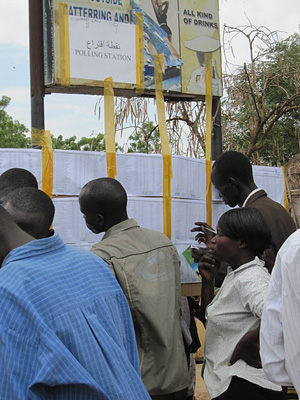
This post originally appeared on Foreign Policy.
"Many people are surrendering," Mohamed Yousuf Omer says, gesturing toward some of the people leaving the polling station at Hai Jalaba Basic School in Juba, the capital of southern Sudan on Sunday. "I think I also may have to." Omer tells me that he could not find his name on the voter registry list posted at the polling station. No name on the list, no point in joining the line of men and women waiting to cast their votes in the first multiparty elections Sudan has held since 1986 — the year Omer, now 24, was born.
"Surrendering" was the word used by several voters I spoke to, who seemed to think that perhaps it was not God’s will for them to vote. Unfortunately, the polling troubles I’ve seen so far here in South Sudan are less than divine: They’re technical and administrative. This election is more complex, more ambitious, and more byzantine than even most Western countries would attempt. Southern voters, 85 percent of whom are illiterate, have 12 separate ballots to fill in. Voters in the North must fill in six. Just three days of polling will have to accommodate 15.7 million voters. An estimated $300 million to $400 million has been funneled into these polls, including $100 million from the United States, in hopes that Sudan can pull it off.
But even apart from the technical complexities, recent weeks have added serious political problems. This election, meant as just a formality on the long road to a 2011 referendum that would let South Sudan vote for its independence, has turned into a major hurdle in itself.
The voting started off slowly on Sunday morning in Juba. Although the polling stations were set to open at 8 a.m., as a Sudanese friend remarked, "In ‘Sudanese time,’ 8 a.m. means 9, if not 10." (I tried to visit more than five before 9 a.m., and only one was open — the one that was stuffed with EU observers.) Voters were willing to wait out a "Sudanese time" delay, but when hours passed and some stations remained closed — because the South Sudan High Elections Committee failed to deliver tables and chairs for the polling staff (many stations in Juba were outside) — patience began wearing thin. Even some of the stations that opened in the morning were forced to temporarily close during the day due to problems with ballot papers and other irregularities.
At the polling stations that were open in Juba, the mood swung between hope, frustration, and confusion — a fairly accurate overview of popular sentiment in the South toward the elections in general. But the predominant feeling to the elections in the South might really be impatience: Since the signing of the North-South peace agreement in 2005, Southerners have never seen this election as an event in and of itself, but rather as a necessary steppingstone en route to their independence from the North.
This mindset has also described that of the international community of late (myself included): Check the box, and move on. Indeed, as the Economist and many other analysts have noted, a mostly peaceful election could allow the North and South to continue their march toward the end of the Comprehensive Peace Agreement’s mandated interim period, before the Southern independence vote and a (hopefully) peaceful divorce. Separation is without a doubt the will of the South. At one elections-related event recently in Juba, it was hard not to join in when people shouted a call-and-response: "South Sudan" — "Independence!"
Click here to continue reading.

